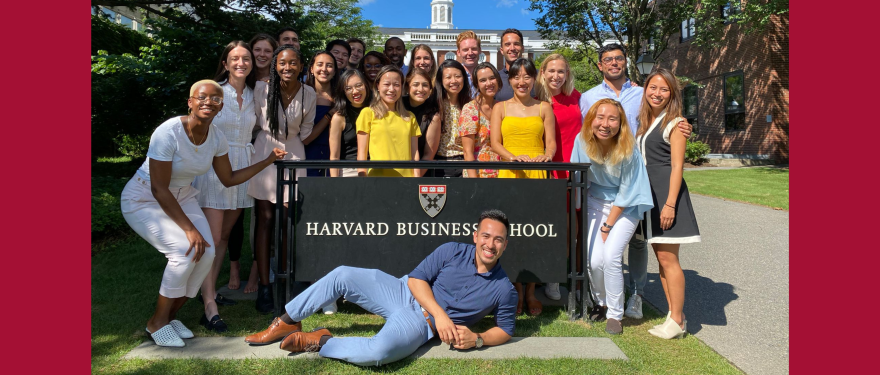In fall 2020, the Harvard Kennedy School incorporated a two-week module on Race and Racism in the Making of the United States as a Global Super power into the MPP core curriculum. The school created this module in response to calls by the student-led HKS Equity Coalition for a course on the history of race and inequity. Led by Professors Khalil Gibran Muhammad and Sandra Susan Smith, the course was designed to ensure a consistent understanding of the race and racism not as tangential to U.S. history, but “at the heart of the American project.” Two HBS/HKS joint degree students, Morgan Brewton-Johnson (a Black woman from Atlanta, Georgia) and Austin Boral (a white man from Jericho, New York) share their thoughts on the course.
Why was the course so important?
Morgan: The course was essential because racism and structural inequality have been essential to the construction of policy and power in the U.S., and it would be impossible to learn policy at Harvard without a comprehensive understanding of that reality. As Professor Muhammad has said, until this point, HKS was wrong “to hand over Master of Public Policy degrees to people who were no smarter in many cases in understanding how the real world works with racism and power… the day they leave the School than the day they arrived.”
Austin: This course was more important to HKS’s mission—improving public policy and leadership—than any other in the core curriculum. That’s because it equipped our class of aspiring leaders with a common understanding of the structural inequalities that current leaders have failed to address. Just as Quantitative Analysis and Empirical Methods taught techniques to analyze issues and Policy Design and Delivery offered frameworks to approach policy challenges, this course provided us with a technical understanding of how race and racism have shaped the most pressing problems of our time.
How effective was the course?
Morgan: The course crucially broadened the perspectives of students who were new to considering how dynamics of identity and power intersect, in the U.S. and abroad. The conversations in the Zoom chat, course Slack, and small discussion groups were very different by the end of the module. Ensuring that all first-year MPPs are operating from a consistent fact base on race and racism, and that everyone has engaged in some critical discussion on those facts, was incredibly valuable.
Austin: In providing a foundation for all first-year MPPs, the course ensured that conversations about race and racism could continue throughout the semester on common ground. I found myself referencing readings, movies, and podcasts we engaged with in conversations both in and outside of the classroom—and knowing that other first-years understood those references allowed us to build on prior knowledge with new perspectives and experiences.
What was the greatest takeaway from the course?
Morgan: My greatest takeaway was how essential it is that none of us takes for granted the degree to which experiences in the same context can vary based on identity. An initial common trap in course discussion was an inclination to say, “I haven’t personally seen or experienced that, therefore I don’t believe it’s true.” I think that by the end of the course, enough evidence was presented to open students up to the reality that each of us have massive blind spots, and that it’s our responsibility to explore our blind spots rather than shy away from them.
Austin: Systemic racism is not a product of past decisions and decision-makers, it is an active choice by individuals and institutions in power. In public school, among a student body with less than twenty Black students among 1,200, I learned about racism in the twentieth century as a lingering blemish of American history. We rarely discussed present-day racism. As James Baldwin put it, “...the great force of history comes from the fact that we carry it within us, are unconsciously controlled by it in many ways, and history is literally present in all that we do.” For me, this course built a clear and compelling connection between America’s past and present pain. It also provided historical and statistical evidence that I can use to more effectively articulate what I’ve learned to others.
How is this course relevant to business leadership development at HBS?
Morgan: The takeaways from this course—that race is central to dynamics of power and influence in our everyday lives, and that each of us has an imperative to better understand perspectives that differ from my own—are incredibly relevant for developing as leaders at HBS. Specifically, the course provides excellent evidence that any advanced degree program of study is incomplete without an identity-conscious lens, and I look forward to advancing and applying these learnings in the business context at HBS.
Austin: If the past year has taught us anything, it’s that structural racism isn’t just a public policy problem. Changing the policies, practices, and institutions that have harmed and oppressed communities of color for centuries requires awareness and action from leaders in government and business alike. This course gave me a foundational understanding of how American capitalism originated and continually perpetuates the racial wealth gap we see today. As Matthew Desmond wrote for The New York Times’ 1619 Project, “...in making possible the pursuit of near limitless personal fortunes, often at someone else’s expense, [unrestrained capitalism] does put a cash value on our moral commitments.”
Featured image: The HBS/HKS joint degree cohort on their first day of class at HBS.

